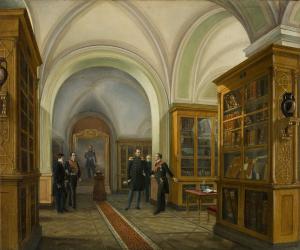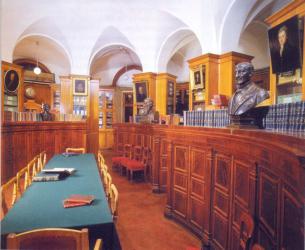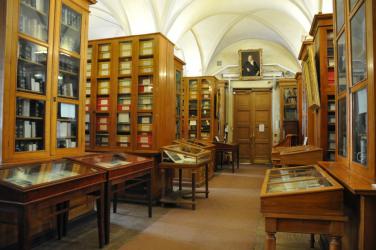Manuscripts Depository
The Manuscripts Department was established on 11 March 1805.
The history of the national repository of manuscripts and private papers began with the outstanding collection of the Russian diplomat Pyotr Dubrovsky (1754-1816), which he donated for the benefit of the Fatherland. He amassed the items at the latter part of the 18th century while serving as the secretary and interpreter with the Russian Embassy at Paris. In 1805, Alexander I of Russia accepted the collection as a gift to the state and ordered to establish a special "Manuscript Depository" at the Imperial Public Library.
This was the real foundation of the first in Russia state repository of handwritten landmarks, offering public access to them. The "Manuscript Depository" became the first department of the Imperial Public Library.The Department of Manuscripts, from its inception, has acquired handwritten materials from public sources and private collections, including libraries from monasteries and personal archives of writers, scientists, government and public figures, composers, artists, architects. The accumulated unique materials provide a strong research base for many generations of scholars. The department's holdings are an inexhaustible source for publishing such world-famous series as Literary Heritage, Poetry Library, Literary Monuments, Monuments of Culture. Valuable archival documents from the libraries of the 18th - 20th century Russian writers and poets have been submitted for publication of the national classical authors, including academic editions of their complete works.
The department has existed for over 200 years as a depository of centuries-old wisdom, imprinted in manuscripts — man-made monuments of human thought.Pyotr Dubrovsky was the first appointed Keeper of Manuscripts from 1805 to 1812. During the period 1828 - 1844, the academician Alexander Vostokov, the outstanding Russian philologist and poet, was placed in charge of manuscripts collections. His successors were the academician Athanasius Bychkov (1844 - 1881) and the corresponding member of the Academy of Sciences Ivan Bychkov (1881 - 1944), the son of Athanasius Bychkov. The department was headed by father and son for more than a hundred years. In the post-revolutionary period, the corresponding members of the Academy of Sciences D. Abramovich, V. Beneshevich, O. Dobiash-Rozhdestvenskaya, V. Maikov (who served here for 46 years) worked in the Department for many years. In the post-war period, the historians, archeographers, and paleographers V. Geiman, E. Granstrem, N. Rozov, D. Alshits, P. Voronova, T. Glushkova, G. Kostygova, V. Zagrebin played a leading role in the department's activities.
Modern custodians of precious manuscripts try to continue the traditions started by their predecessors. Experienced and well-qualified staff bolster the high prestige enjoyed by the department among the international scientific community and public. The Manuscripts Department holds a well-deserved reputation for professional excellence of descriptions, catalogues, studies of the manuscripts, facsimile editions. It successfully applies innovative information technologies, such as electronic books, available online.Today, the Manuscripts Department is one of the world's largest repository of manuscripts and autograph documents, which houses priceless treasures numbering more than 430 thousand valuable items for all periods and countries. The time span of the collections is from the 10th century before Christ (papyri from Ancient Egypt) to the present day.


